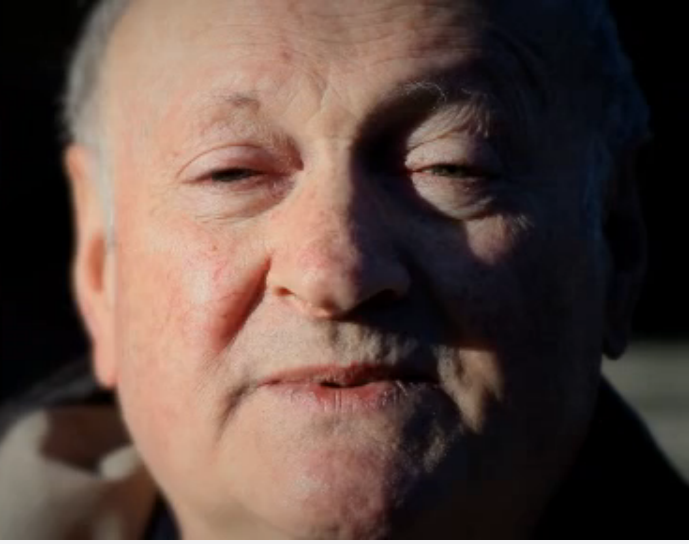
Simon Winston
Simon Winston is from the Ukraine. He is a survivor of the Holocaust. In this Untold Stories film he speaks about the experience of escaping the Ghetto with his family and living in hiding.
[Simon is sitting on a bench, outside the Holocaust Centre in Newark]
In 1941 when Germany attacked Russia and the Russians fled because they weren’t expecting it, we soon realised that the Germans didn’t like Jews.
The Jews were ordered to go into the market square, all seven thousand of us. And when we got there a group of twenty Gestapo machine gunners came. And they pointed their machine guns at us, and we thought they were going to kill us and people were screaming and crying and fainting and praying. And then a car pulled up outside the square, and a very high ranking officer came out of the car, waved his arm, the machine gunners put their machine guns away, and they left.
When we got back to our houses we discovered that they were empty. The Germans had stolen all our possessions. About six months later the Germans created a new home for us, a new ghetto, a prison.
My father was very pragmatic, even before the ghetto was built. He prepared himself. What he did, he sold most of his valuables and he converted the money into gold bars, eight ounce gold bars, today worth about ten thousand pounds or more. And he would hide these gold bars in various clothing, bottoms of shoes, false bottoms on brushes, et cetera. And probably the first gold bar we would have used would have been to bribe one of the guards to let us escape. And that was a miracle.
So we escaped from the ghetto. I remember walking down a river, the river that separated our town, Radzivilov, from Brody, a nearby town where my mother and my brother were born. We couldn’t cross by the bridge because we were advised by somebody that the bridge was being guarded by Ukrainian Nazis, so we went downstream.
And this is where I start remembering things because I remember walking down the river and my father suddenly walking into the river and I thought ‘what’s he doing? He’s crazy’. And then he walked across the river, and as he walked across the water got higher and higher until it came up to his neck; when he got to the middle of the river, the water came up to his neck. But it didn’t drown him, so he was able to come back and collect each one of us – that’s me, my brother and my mother, carry us piggy-back style to the other side of the river, and now we were free, but soaking wet.
And a second miracle. A woman came out of a solitary house and she saw us. Could have easily handed us in because she must have recognised we were escaped Jews from the ghetto, probably got rewarded for us. But no, she invited us into her house, allowed us to dry ourselves, warm ourselves, even gave us some fresh clothing, and then allowed us to sleep over night. But in the morning she said ‘Please, please don’t ask us to hide you any longer because the Germans have been, they’ve threatened us that if we find any Jews here, your family will be killed.’
So we were on our way looking for our first hiding place, or our next hiding place. It was a very cramped bunker under a pigsty. Even less space than in the ghetto. And less food because the farmers, all the farmers in Poland, were regularly raided by Nazi soldiers and having their food stolen, so the farmer not only didn’t have much food to give us, but also we weren’t allowed to surface in the day time. We were always frightened, or he was frightened the farmer was frightened of the Germans coming and finding us on the farm. So we had to only surface at dusk. And at dusk we had to slop out, get some fresh water, take a breath of fresh air, and then back into the bunker to sleep.
And then the third bunker; my father was able to invite some other relatives and friends to join us because there was more room. And he invited my mother’s brother’s wife. She was pregnant. And she gave birth actually in the cellar. And the baby screamed, and when the farmer heard about this he told us to get out. He was frightened for his own life and his family’s life. And we had to make a terrible, terrible decision. Life or death; life for one child, or the death of all of us, including that child. Had I been a grown-up I think I might have liked to have taken a different decision, made a different decision. But I don’t know, it’s a very, very difficult situation. A very, very traumatic and impossible decision to have to make.
Shortly after that, I remember the farmer opening the cellar trap door and the sun was shining and he said ‘You’re free’. I didn’t know what that meant. I thought that I was going to live like this for the rest of my life, or get killed. And sure enough, the Germans were in retreat. They’d been kicked out of Poland by the Russians, and the Russians were back. And the farmer even said, ‘You can go back to your houses.’ We tried to go back to our houses, but our houses were occupied by Russians and Ukrainians and they weren’t prepared to give them back to us. So we became refugees.